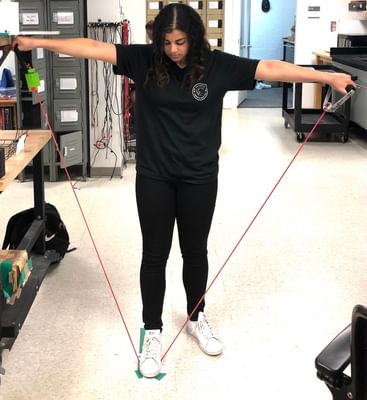- Undergraduate
Bachelor's Degrees
Bachelor of ArtsBachelor of EngineeringDual-Degree ProgramUndergraduate AdmissionsUndergraduate Experience
- Graduate
Graduate Experience
- Research
- Entrepreneurship
- Community
- About
-
Search
All Thayer News

Dartmouth Startup Wins Funding for Remote Physical Therapy Monitoring System
Apr 20, 2021 | by Julie Bonette
A team of researchers from Dartmouth has been awarded nearly $225,000 from the National Institute on Aging (NIA), part of the National Institutes of Health (NIH), to develop and test "BandPass," a remote-sensing resistance band exercise system that would allow health care providers to monitor, evaluate, and guide patients as they use the device in their homes.

SynchroHealth cofounder Suehayla Mohieldin '19 Th'20 tests a BandPass prototype. (Photo courtesy of Suehayla Mohieldin)
"There’s a huge disparity in what clinicians and physical therapists think goes on in at-home rehabilitation programs and what actually happens," said Principal Investigator Ryan Halter, professor of engineering and of surgery at Dartmouth, as well as co-founder of SynchroHealth, LLC, the company that was awarded the grant. "This disconnect often results in changes to the provider’s future treatment plans and could ultimately lead to unnecessary interventions that increase costs and potential risks to the patient. We’re aiming to close that gap."
The Bluetooth-enabled device is being designed specifically for the treatment of age-related loss of muscle mass and strength, known as sarcopenia, that affects almost 15 percent of adults over the age of 60. Similar to other at-home resistance-based exercises, BandPass would promote muscular regeneration and growth, but it would be unique in that the data collected could motivate patients and be monitored by a physician in order to intervene, should the patient not perform the exercises regularly or correctly.
It is often challenging for health care providers to assess at-home compliance as they must rely on patient self-reports that can be inaccurate and subject to bias; compliance rates are usually around 40 percent, according to the researchers.
The one-year Phase I Small Business Technology Transfer (STTR) grant will enable SynchroHealth to further develop and refine a previous prototype, as well as develop a mobile application and cloud-based service for data transmission, processing, and storage. Later this year, the team will also test their device on a cohort of 16 patients to obtain feedback.
"I'm thrilled that all the hard work that went into designing and testing the device has led to a feasible consumer product with the potential to help a lot of people. I believe that BandPass can really upend the status quo in resistance-based exercise programs, bridging the gap between clinicians and patients by allowing for easier and more accurate remote monitoring of physical therapy exercises."
SynchroHealth cofounder Suehayla Mohieldin '19 Th'20
Along with Halter and Mohieldin, the BandPass team is comprised of SynchroHealth co-founders: Curtis Petersen Geisel '14 Guarini '20 '21, Colin Minor Th'19 Th'21, and John Batsis, currently an associate professor in geriatric medicine at the University of North Carolina's School of Medicine, Chapel Hill, and a former associate professor of medicine at Dartmouth.
After the current grant period ends in December, the team plans to apply for a Phase II STTR grant in order to investigate manufacturing, lab-to-market strategies, and further human studies. The researchers also plan to examine other potential applications for the device outside of sarcopenia, such as athletic rehabilitation and general strength training.
Research reported in this publication was supported by the National Institute On Aging of the National Institutes of Health under Award Number R41AG071290. The content is solely the responsibility of the authors and does not necessarily represent the official views of the National Institutes of Health.
For contacts and other media information visit our Media Resources page.
